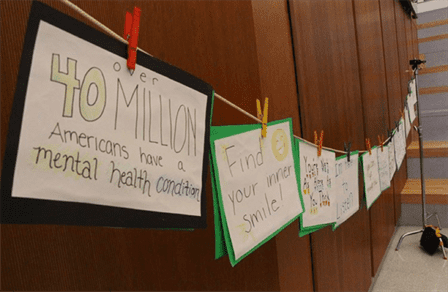
Student-written messages are hung up for the Stomp the Stigma event.
Photo courtesy of Montclair State Active Minds
While the holiday season can be a joyous time to celebrate with family and friends, many students struggle during this time of year at Montclair State University. Some students experience high levels of anxiety and depression from the pressure of final exams and purchasing gifts for their loved ones.
Bridget Dodge, a freshman political science major, is one student who feels that their stress and mental health challenges intensify during the winter months.
“My depression increases a lot during the winter season,” Dodge said. “My anxiety gets bad during the holidays with gift buying and dealing with family issues.”
Some students, like freshman child advocacy and policy major Neha Sampat, feel more fatigued and isolated in the winter. This is usually because they do not adjust well to the cold weather. Sampat said her depression is triggered on days that feel more depressing, like most winter days.
Many who suffer from mental health challenges find that they have harsher symptoms when the seasons change. This is called seasonal affective disorder (SAD), which is a type of depression that usually occurs in the fall and winter.

David Pontrella works on a final project and opens up about seasonal affective disorder (SAD).
Mackenzie Robertson | The Montclarion
Some students with SAD say it happens because of the cold, dreary weather and lack of sunlight.
“I suffer from seasonal affective disorder,” said David Pontrella, a sophomore psychology major. “It is when I develop depression during the winter months.”
Montclair State students, in conjunction with campus organization Active Minds, put on an event in early December to discuss mental health and its effects on students. They encouraged students to ask questions and feel comfortable enough to be open about any mental health challenges they may have.

From left to right: Stephanie Cardoso, a senior in the Theory and Practice of Advocacy Class, moderating the discussion with Cindy Nelson, Christopher McKinley and Sudha Wadhwani.
Therese Sheridan | The Montclarion
The event, called Stomp the Stigma, featured a panel discussion with three professors who teach at Montclair State and staff psychologist Dr. Sudha Wadhwani from Counseling and Psychological Services (CAPS).
“It’s been a particularly stressful semester,” Wadhwani said. “As it goes on, you are juggling a lot, [such as] academics, student leadership activities, involvement in various organizations, work, family and relationships.”
Wadhwani emphasized the importance of preventing the stigma around mental health. She said stress can be managed with different strategies depending on how students view themselves.
“It is important to have an awareness [and] recognize those signs within ourselves,” Wadhwani said. “If it can get to a point where [stress] works against us, there are so many strategies, whether it is therapy or exercising or reaching out for support.”
According to the 2015 National College Health Assessment, 85 percent of college students reported feeling overwhelmed by everything they had to do at some point in that year. The study also found that 30 percent of college students had stress negatively affect their performance in school.
CAPS offers both individual and group therapy for the Montclair State community. There are also opportunities for students to get involved in group counseling and other educational and consultative services targeted at promoting mental wellness.
“Montclair [State] has been more than excellent in helping me during these struggles,” Dodge said. “I had a weekly one-on-one session and joined a group.”
In addition to short-term weekly sessions, CAPS offers a walk-in program called Let’s Talk that allows students one-on-one confidential support. These sessions are free and are offered Monday through Friday at eight different locations across campus. Times and locations can be found on the CAPS website.
“Let’s Talk and having all these other resources at Montclair [State] really helps,” said Iman Brooks, a freshman chemistry major. “It shows that you’re not alone and you have people that are going through what you’re going through.”



